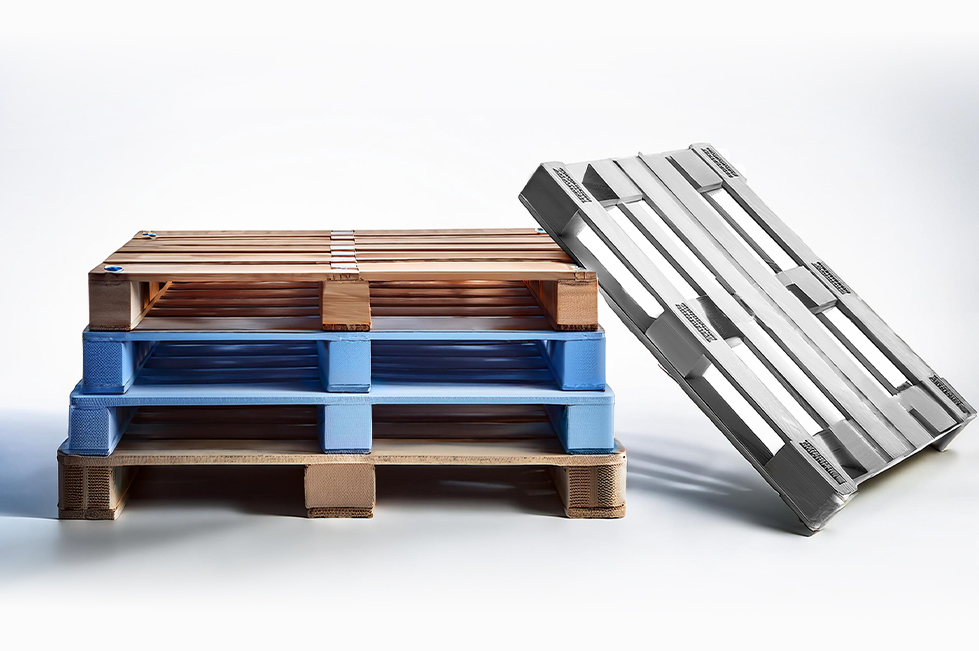


Endüstriyel ambalaj dünyasında, ürünlerin taşınması ve depolanması için kullanılan paletler hayati bir role sahiptir. Yıllardır yaygın olarak tercih edilen ahşap paletler, dayanıklılık, uygun maliyet ve çevre dostu yapısıyla bilinir. Ancak son yıllarda plastik, metal ve kağıt gibi alternatif palet malzemeleri de gelişme göstermiş, endüstriyel ambalajda çeşitli seçenekler sunmaya başlamıştır. Bu yazıda, ahşap paletlerin endüstrideki yerini ve diğer alternatif malzemelerle kıyaslandığında sunduğu avantajları inceleyeceğiz. Gelecekte hangi palet türlerinin öne çıkabileceğine dair bir değerlendirme sunarak, işletmeler için en uygun çözümlere dair bilgiler paylaşacağız.
Ahşap paletler, endüstriyel ambalajda yıllardır tercih edilen bir çözüm olarak öne çıkmaktadır. İşte ahşap paletlerin sunduğu başlıca avantajlar:
Dayanıklılık ve Taşıma Gücü: Ahşap paletler, ağır yükleri güvenle taşıyabilme kapasitesine sahiptir. İnşaat malzemeleri, otomotiv ürünleri gibi ağır sanayi ürünlerinin taşınmasında ahşap paletler sıklıkla tercih edilir.
Çevre Dostu ve Sürdürülebilirlik: Ahşap doğal bir malzeme olduğundan, geri dönüştürülebilir ve biyolojik olarak parçalanabilir. Ahşap paletlerin kullanımı, çevre dostu bir seçenek sunarken, sürdürülebilir orman yönetimiyle üretildiğinde karbon ayak izini azaltmada da katkı sağlar.
Onarım Kolaylığı: Ahşap paletler, hasar gördüklerinde kolayca onarılabilir ve tekrar kullanılabilir. Bu durum, işletmelere maliyet avantajı sunar ve aynı paletin kullanım ömrünü uzatır.
Ekonomik Çözümler: Ahşap paletler, diğer malzemelere göre genellikle daha düşük maliyetlidir. Bu durum, özellikle büyük hacimli taşımacılık yapan işletmeler için önemli bir avantaj sağlar.
Ahşap paletlerin avantajlarına rağmen, farklı malzemelerden üretilen paletler de belirli kullanım alanlarında öne çıkmaktadır. Endüstriyel ambalajda yaygın olarak kullanılan alternatif palet malzemeleri arasında plastik, metal ve kağıt bulunur. Bu malzemelerin avantaj ve dezavantajlarını inceleyelim:
Plastik Paletler
Avantajlar: Plastik paletler hafif olmaları ve suya dayanıklılıkları ile öne çıkar. Hijyenik özellikleri sayesinde özellikle gıda ve ilaç sektöründe tercih edilirler. Ayrıca uzun ömürlü olmaları ve çok kez kullanılabilir olmaları, işletmelere uzun vadeli maliyet avantajı sağlar.
Dezavantajlar: Plastik paletler, ahşap paletlere göre daha pahalıdır ve yüksek sıcaklıklara maruz kaldıklarında deforme olabilirler. Ayrıca, tamir edilme olanakları sınırlıdır; hasar gördüklerinde genellikle geri dönüşüm sürecine alınırlar.
Metal Paletler
Avantajlar: Metal paletler, yüksek dayanıklılık ve ağır yük taşıma kapasitesine sahiptir. Özellikle ağır sanayi sektöründe tercih edilen metal paletler, aşırı sıcaklık veya zorlu çevre koşullarında dayanıklılık sağlar. Yangına karşı dirençli olmaları da avantajları arasındadır.
Dezavantajlar: Metal paletler, diğer malzemelere göre oldukça maliyetlidir ve taşınması daha zordur. Aynı zamanda, metal paletlerin üretimi ve geri dönüştürülmesi daha fazla enerji gerektirdiğinden çevresel etkileri daha yüksektir.
Kağıt Paletler
Avantajlar: Kağıt paletler, hafif ve geri dönüştürülebilir özellikleriyle çevre dostu bir alternatiftir. Hava taşımacılığında ağırlık tasarrufu sağlaması sayesinde tercih edilir. Ayrıca, kağıt paletler genellikle düşük maliyetli olup ihracatta kolaylık sağlar.
Dezavantajlar: Kağıt paletler, nem ve darbelere karşı dayanıklı değildir, bu da kullanım ömürlerini kısaltır. Genellikle hafif ürünlerin taşınması için uygundur ve ağır yük taşıma kapasitesi sınırlıdır.
Ahşap paletler, sundukları dayanıklılık, onarılabilirlik ve çevre dostu özellikleri sayesinde birçok sektörde tercih edilmeye devam edecektir. Ahşap paletlerin, özellikle ağır sanayi ve perakende sektöründe ekonomik ve pratik çözümler sunmaya devam etmesi beklenmektedir. Ayrıca, ahşap paletlerin sürdürülebilir kaynaklardan temin edilmesi, çevreye olan olumsuz etkileri azaltmada katkı sağlar. Diğer yandan, plastik ve metal paletler gibi alternatifler belirli sektörlerde öne çıksa da yüksek maliyetleri ve onarım olanaklarının kısıtlı olması ahşap paletleri daha cazip kılmaktadır.
Ahşap paletlerin gelecekte dijital teknolojilerle uyumlu hale getirilmesi, endüstri 4.0 çerçevesinde takip edilebilirlik ve veri analizi avantajları sunması da potansiyel yenilikler arasındadır. RFID ve GPS gibi teknolojilerle donatılmış ahşap paletler, işletmelere lojistik süreçlerde daha fazla kontrol ve verimlilik sağlayabilir.
Ahşap paletler, alternatif malzemelerle kıyaslandığında hem ekonomik hem de çevresel avantajları ile öne çıkmaktadır. Geri dönüştürülebilir olmaları, sürdürülebilir kaynaklardan temin edilebilmeleri ve onarım kolaylığı, ahşap paletlerin uzun vadede tercih edilen bir seçenek olmaya devam etmesini sağlamaktadır. Plastik, metal ve kağıt gibi alternatif paletler belirli kullanım alanlarında avantaj sunsa da her sektöre hitap eden esnekliği sağlamaları zor gözükmektedir.
Gencer Ambalaj olarak, yılların deneyimiyle sunduğumuz ahşap palet çözümlerimizle endüstriyel ambalaj ihtiyaçlarınıza cevap veriyoruz. İşletmenizin verimliliğini artırmak ve çevre dostu çözümlerle sürdürülebilirlik hedeflerinize ulaşmak için bize ulaşın.